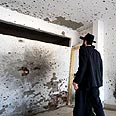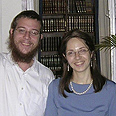

A new rabbi has arrived, a new community center is open and their worldwide Chabad-Lubavitch movement is once again at full strength in Mumbai pursuing its mission to support Jewish life wherever Jews can be found.
The three-day siege in November 2008 claimed 166 lives, including Rabbi Gavriel Holtzberg, his wife Rivka and four others at the Chabad House near the luxury hotels, railway station and cafe also attacked by the Pakistan-based militants. Rabbi Chanoch Gechtman recently arrived from Israel with his wife Leiky to continue Holtzberg's work in a new centre a short walk from the original house badly damaged in the assault.
"The Mumbai Jewish community definitely wants to move beyond 26/11," Gechtman, 25, said in an email from Mumbai. "We need to focus forward on helping the many people who need our assistance, so Jewish life flourishes here."
This kind of dedication is the hallmark of Chabad, a Hasidic movement that has built community centers, synagogues, schools and camps around the world in recent decades to promote Jewish observance and bring less devout Jews back into the fold.
"I'm totally impressed, but not surprised, by the fact that they're already reopening the Chabad House in Mumbai," said Henry Goldschmidt, author of a study on Chabad and the Jewish enclave that has grown up around its world headquarters in the Crown Heights neighborhood of Brooklyn.
Judaism's High Holidays began on Wednesday evening and runs for 10 days, from the beginning of Rosh Hashana, or Jewish New Year, and ending with the Yom Kippur day of atonement.
Chabad houses worldwide
Gechtman knows the challenge ahead of him. He spent five months in Mumbai in 2006 helping the Holtzbergs after the birth of their son Moshe, whose nanny saved him from the killers. Rabbi Holtzberg was only 29 when he died.
The Mumbai Chabad House is one of around 3,500 institutions the movement runs in 77 countries around the world.
About 4,000 married couples run Chabad houses that offer kosher Shabbat dinners for any Jew who turns up and Torah classes, religious services or schools for those who want them.
India has fewer than 5,000 Jews, but many foreign Jews pass through Mumbai on business or vacation and the centre serves them as well as local residents.
There are centers as far away as South Korea, Congo and Northern Cyprus. Chabad is booming in Russia, with synagogues, centers and schools in 44 cities - 30 in Moscow alone.
"The largest Passover seder in the world is held annually in Katmandu - about 2,000 people participate in that," said Rabbi Zalman Shmotkin, Chabad spokesman and director of its extensive Chabad.org website at the Crown Heights headquarters.
Most of them are Jewish backpackers, many from Israel, who schedule their hiking holidays so they can attend it, he said.
There are dozens of centers in large US cities, but also one in the small town of Bozeman, Montana. "I think there's one Jew for every 2,000 cows there," Shmotkin joked.
Dynamic outreach
Chabad followers, also known as Lubavitchers, belong to the ultra-Orthodox Hasidic school of Judaism, but their centers are open to all Jews regardless of how observant they are.
More mainstream Jews disagree with Chabad's messianic focus, especially the belief a minority espoused that their late Rabbi Menachem Mendel Schneerson was or may have been the Messiah.
But even liberal rabbis and secular Jews credit them with highly successful outreach programs that have strengthened Jewish life on college campuses, raised the profile of Judaism in public life and influenced Jews outside the Hasidic world.
The movement risked schism after Schneerson died in 1994. A messianic minority believed he was not even dead while many in the majority said the question of whether he was the messiah was not central to the mission he had given them.
The two camps worked out a modus vivendi over the years as the movement recovered and focused on the trademark outreach mission that accounts for much of its dynamism.
The number of young couples leaving on these missions more than doubled in the 1999-2008 period compared to the previous 10-year period, to 1,589 from 715, Chabad figures show.
About four new couples now set out every week to open a new Chabad centre somewhere in the United States or around the world, Shmotkin said. The mission is a joint effort, with the wife playing a key role, and the assignment is usually for life.
Gechtman echoed that dedication in his message from Mumbai. "People really believe in this city. It's a place with a lot of energy," he wrote. "We hope and pray that the new year will be a good one, rife with good news and tranquility."
- Follow Ynetnews on Facebook















